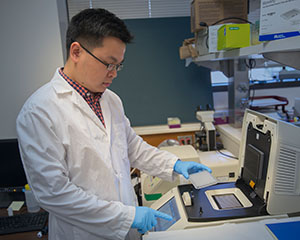Texas A&M Student Wins Award from the American Heart Association
COLLEGE STATION, TX – Research conducted at the Texas A&M College of Veterinary Medicine & Biomedical Sciences (CVM) may eventually explain and help prevent the chronic health conditions that often accompany obesity.

Wei Ying, a second-year PhD student in the Veterinary Physiology & Pharmacology Department (VTPP) at the CVM, won an American Heart Association Pre-Doctoral Award for his work in this area. The award, spread out over two years, totals $50,000.
“This is a prestigious award for a graduate student,” said Beiyan Zhou, VTPP Assistant Professor and co-chair of Ying’s Ph.D. committee.
“We are excited to see Wei Ying recognized for his talent, future potential, and the quality of this work in a supportive research environment,” Dr. Eleanor M. Green, Carl B. King Dean of Veterinary Medicine, said. “This work is important with implications in many species. This award speaks to his excellence as well as that of his faculty mentors.”
“I’m very lucky,” Ying said. “Not many students would have these opportunities.”
Ying, who works in Zhou’s lab, came to the CVM from the Animal Science Department in the College of Agriculture and Life Sciences. He originally wanted to create leaner, higher quality beef, and that interest led him to his current research into human weight gain and obesity.
“Obesity is an epidemic worldwide that contributes to adverse health outcomes, including insulin resistance, type II diabetes mellitus, obstructive sleep apnea, osteoarthritis, stroke, hypertension and certain types of cancer (such as colon and breast cancers), and cardiovascular diseases that are collectively referred to as metabolic syndrome,” said Fuller Bazer, Regents Fellow, Distinguished Professor & O. D. Butler Chair, Physiology of Reproduction, Department of Animal Science and co-chair of Ying’s Ph.D. committee.
“Ying’s study represents the true spirit of the One Health Initiative,” said Dr. Bhanu Chowdhary, Associate Dean for Research & Graduate Studies at the CVM. “The interdisciplinary research focus he and mentors have developed will potentially lead to discoveries that improve the health of both animals and humans. It is an important area of research with broad impacts on human and animal health, and this recognition from the American Heart Association is well-deserved.”
Specifically, Ying is focusing on the role of tiny RNA strands called microRNA that are thought to indirectly lead to metabolic syndrome. These little pieces of genetic material influence the abundance of a type of cell called the macrophage. Although macrophages are a normal and important part of the immune system, in obese people they seem to have the negative effect of increasing the inflammation that can lead to insulin resistance and development of metabolic syndrome.
“The fellowship received by Wei Ying from the American Heart Association will allow him to conduct in-depth studies on roles of microRNA 223,” Bazer said. MicroRNA 223 can affect the number of a certain type of macrophage that has the opposite result of most macrophages; it favors an anti-inflammatory state in white fat deposits and, in turn, actually reduces the risk of metabolic syndrome.
Ying’s research will also explore how key molecules influencing the development of obesity are regulated to reduce proliferation of “white adipocytes” that make up white fat deposits, in which inflammatory macrophages exist.
The three criteria for the American Heart Association award are the student’s potential, the research environment (including mentors and institutional support), and the research proposal (including its significance and originality). Ying has all three.
“He has outstanding potential,” said Stephen Safe, Distinguished Professor in VTPP and a member of Ying’s Ph.D. committee, “and is guided by Dr. Beiyan Zhou, who is making exciting new discoveries about the role of non-coding RNAs in the cardiovascular system.”
Bazer, Safe, and Guoyao Wu, who is a Distinguished Professor in Animal Nutrition in the College of Agriculture and Life Sciences, wrote letters of reference for the award and act as Ying’s mentors.
“These three distinguished professors give me so much support,” Ying said. “I’m very grateful to them.”
“What he’s doing is original,” Zhou said. “After all, the discovery of microRNA was only about 10 years ago.”
“When you are doing something you like, you don’t mind spending 16 hours a day working on it,” Ying said. “I absolutely love what I’m doing. I’m very proud to have won this award.”
Ultimately, he hopes to develop improved therapies to decrease inflammation and insulin resistance in obese individuals, which would then prevent them from developing metabolic syndrome.


